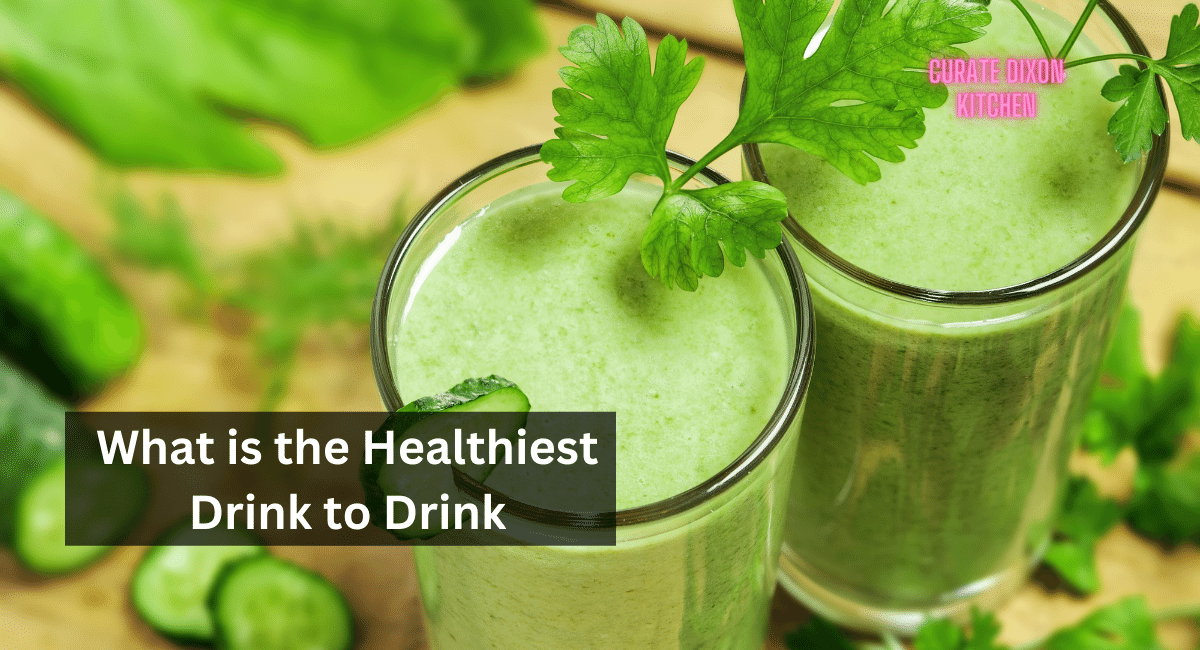Selecting the healthiest beverage for everyday use is a critical decision that has a significant impact on your general health. While water is frequently regarded as the gold standard, numerous other drinks have special health advantages. The numerous options, their benefits, and how to make wise decisions will all be covered in this article.
1. Water: The Elixir of Life
Water is often called the elixir of life, and for good reason. It is the most essential beverage for human survival. It is essential to stay hydrated for good health. Drinking water regulates body temperature, aids digestion, and supports cognitive function.
Importance of Hydration
Staying hydrated is crucial for good health. While drinking at least 8 cups (64 ounces) of water per day is recommended, individual needs may vary, and dehydration can lead to issues like fatigue and kidney stones.
Benefits of Drinking Water
- Clear Skin: Proper hydration can improve skin elasticity and reduce the risk of acne.
- Weight Management: One way to regulate one’s appetite is by drinking water before meals.
- Toxin Elimination: Water flushes toxins from the body through urine.
- Joint Health: Adequate hydration supports joint lubrication and reduces the risk of injuries.
2. Green Tea: Nature’s Antioxidant
Many people are aware that green tea possesses powerful antioxidant properties, which health-conscious people favor. It is high in polyphenols, which fight free radicals and reduce the likelihood of chronic diseases.
Health Benefits of Green Tea
Heart Health: Drinking green tea can lower the body’s dangerous cholesterol levels, which reduces the risk of heart disease.
- Weight Loss: According to several studies, green tea has the potential to increase metabolism and assist with weight management.
- Brain Function: The caffeine and L-theanine in green tea may enhance cognitive function.
How to Incorporate Green Tea Into Your Diet
Enjoy green tea as a soothing hot beverage, or use it as a base for refreshing iced tea. It is advisable to have 2-3 cups per day to fully enjoy its advantages.
3. Herbal Infusions: A Natural Remedy
Herbal infusions are caffeine-free and offer a wide array of health benefits. These beverages provide natural remedies for various ailments, from calming chamomile to invigorating ginger.
Types of Herbal Infusions
- Chamomile: Promotes relaxation and aids sleep.
- Peppermint: Eases digestive discomfort and freshens breath.
- Ginger: Relieves nausea and supports digestion.
Medicinal Properties
Many herbs used in infusions have medicinal properties, making them a valuable addition to your wellness routine. However, please consult a healthcare professional before using them for specific health concerns.
4. Freshly Squeezed Juices: A Burst of Nutrients
Because they are a great source of vitamins and minerals, freshly squeezed juices are a great option for nutritional absorption. It’s crucial to distinguish between fresh juices and those purchased at a shop, though.
Nutritional Value of Fresh Juices
Homemade juices retain more nutrients since they are not pasteurized or processed extensively. They provide a concentrated dose of vitamins and antioxidants.
Homemade vs. Store-bought
Juices from the store frequently have extra sugar and preservatives, which reduces their health advantages. Wherever feasible, choose freshly squeezed or blended juices.
5. Milk: The Classic Calcium Source
Milk has long been touted as a calcium-rich beverage that supports bone health. While it is a valuable source of nutrients, there are alternatives for those with dietary restrictions.
Benefits of Milk Consumption
- Calcium: Consuming milk is highly recommended as it is a great source of calcium that is crucial for maintaining strong bones.
- Protein: It provides high-quality protein essential for muscle health.
- Vitamins: Milk is rich in vitamins like B12, which are crucial for overall well-being.
Dairy vs. Plant-Based Options
Plant-based milk alternatives like almond, soy, or oat milk are available for individuals who are lactose intolerant or follow a vegan diet. Often, these options contain added vitamins and minerals to mimic the nutrients found in dairy milk.
6. Smoothies: The Power Packed Breakfast
Smoothies are a convenient way to pack nutrients into your morning routine. They offer versatility in ingredients, catering to various dietary needs and taste preferences.
Nutrient-rich Ingredients
Include a combination of fruits, vegetables, protein sources, and healthy fats in your smoothies. This ensures a well-rounded meal replacement or snack.
Smoothie Recipes for Different Health Goals
- Weight Loss: Green smoothies with spinach, banana, and almond milk.
- Muscle Recovery: Protein-rich smoothies with Greek yogurt and berries.
- Energy Boost: Add a scoop of matcha powder for a caffeine kick.
7. Coffee: The Energizing Brew
Coffee is a beloved beverage worldwide, known for its ability to provide an energy boost. However, consuming it in moderation is essential to avoid potential side effects.
Pros and Cons of Coffee
- Energy Boost: Caffeine in coffee can increase alertness and concentration.
- Antioxidants: Coffee contains antioxidants that may have health benefits.
- Sleep Disruption: Excessive coffee consumption can lead to sleep problems and anxiety.
Moderation is Key
Limit your daily coffee intake to 3-4 cups, and be mindful of the timing to avoid interfering with your sleep cycle.
8. Coconut Water: Nature’s Sports Drink
After exercise or on a hot day, coconut water, a naturally electrolyte-rich beverage, can help replenish lost fluids. It’s a better option than sugar-filled sports drinks.
Electrolyte Replenishment
Coconut water contains potassium, sodium, and magnesium, making it effective in preventing dehydration and muscle cramps.
Health Benefits of Coconut Water
In addition to hydration, coconut water may support digestion and kidney function. It is low in calories and free from artificial additives.
9. Tea vs. Coffee: The Great Debate
The choice between tea and coffee often comes down to personal preference and lifestyle. Let’s compare these two popular beverages.
Comparison of Tea and Coffee
- Caffeine Content: Did you know tea has less caffeine than coffee? This means that tea provides a gentler energy boost compared to coffee.
- Antioxidants: Both beverages contain antioxidants, but types and amounts vary.
- Taste Profile: Tea has a wide range of flavors, while coffee is known for its robust taste.
Which One Suits Your Lifestyle?
Consider your caffeine tolerance, flavor preferences, and how each beverage makes you feel when choosing between tea and coffee.
10. Alcoholic Beverages: Sip Responsibly
Alcoholic beverages can be a part of social gatherings and celebrations, but they should be consumed in moderation to avoid health risks.
Health Effects of Alcohol
- Moderate Consumption: Some studies suggest moderate alcohol intake may have heart health benefits.
- Excessive Drinking: Overconsumption can lead to liver damage, addiction, and other health issues.
Moderation Guidelines
Follow established guidelines for alcohol consumption, which generally recommend up to one drink per day for women and two drinks per day for men.
11. Infused Water: Flavorful Hydration
Infused water is a delightful way to stay hydrated while enjoying a burst of flavor. Add fruits, herbs, or spices to your water and let it infuse.
Infusion Ideas
- Citrus Delight: Lemon and lime slices with fresh mint leaves.
- Tropical Paradise: Pineapple chunks and coconut shavings.
- Cucumber Refresh: Cucumber slices and basil leaves.
Benefits Beyond Taste
Infused water enhances your water’s flavor and encourages increased water intake due to its pleasant taste.
12. Kombucha: The Trendy Fermented Drink
Kombucha, a fermented tea beverage, has gained popularity for its potential gut health benefits. It’s a probiotic-rich drink that can support your digestive system.
Gut Health and Kombucha
A balanced population of gut bacteria is promoted by the probiotics in kombucha, which can enhance digestion and general health.
Making Your Own Kombucha
If you’re a DIY enthusiast, consider brewing your kombucha at home. It allows you to control ingredients and flavors while enjoying the health benefits.
Finding Your Perfect Drink
In the world of beverages, there is no one-size-fits-all answer to the question of the healthiest drink. The key is making informed choices based on your preferences and health goals. Whether it’s the simplicity of water, the antioxidants in green tea, or the nutrient-packed goodness of fresh juices, there’s a beverage that suits your lifestyle and contributes to your well-being.
Cheers to a healthier you!










